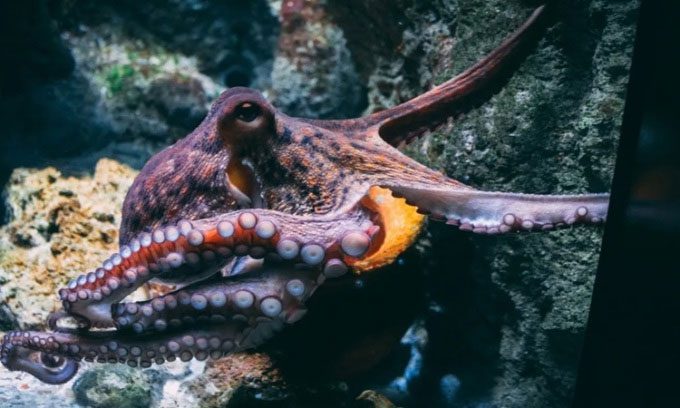The company Nueva Pescanova is facing opposition from various animal welfare organizations regarding its plan to build a farm to produce 3,000 tons of octopus each year.
After overcoming several challenges associated with commercial octopus farming, a Spanish seafood company is planning to construct the world’s first octopus farm. However, this plan has encountered significant backlash from animal rights groups, as reported by IFL Science on February 13.

Octopus is a highly intelligent animal. (Photo: Diane Picchiottino/Unsplash).
Nueva Pescanova plans to establish a 52,691m2 facility specifically for octopus farming along the Las Palmas port in the Canary Islands of Spain, located in the Atlantic Ocean. The two-story building will manage every step of the octopus farming process, from breeding to packaging and shipping. Larvae will be hatched and initially fed seaweed. In the next phase, which lasts 6 to 15 months, the juvenile octopuses will be fed crabs. Eventually, they will be placed in a communal tank to complete their development before being slaughtered, frozen, packaged, and shipped. The farm hopes to produce about 3,000 tons of octopus annually, equivalent to the slaughter of approximately one million individuals.
In reality, commercial octopus farming on an industrial scale presents numerous challenges. There are significant hurdles in managing the breeding cycle, nurturing the young, and providing a suitable environment for the species. With hopes of pioneering in this high-profit area, Nueva Pescanova is collaborating with scientists to address these issues. In 2018, their research team successfully hatched dozens of common octopuses (Octopus vulgaris), the most commonly consumed species in Spain. Notably, the juvenile survival rate was around 50%. In the wild, their survival rate is only 0.0001%.
With the increasing demand for octopus meat, consumers are also becoming more aware that octopuses are highly intelligent creatures capable of solving complex problems and experiencing pain. Some scientists even speculate about their potential for consciousness. The intelligence of octopuses raises ethical questions about the appropriateness of exploiting them in industrial farming. Since 2019, numerous non-governmental organizations have expressed concerns about the prospect of octopus farming becoming a new trend in the global food market.
In October 2023, a coalition of environmental and animal welfare organizations, including Compassion in World Farming, Eurogroup for Animals, Greenpeace Spain, and Oceana UK, sent a petition to the Canary Islands government urging them to reconsider Nueva Pescanova’s licensing application. The organizations called on the island authorities to halt the plan due to its unsustainable nature and animal cruelty. They also argued that the chosen method of slaughtering octopuses is inhumane and leads to millions of slow, painful deaths.
These organizations emphasize that octopuses are wild animals unsuitable for farming. As naturally solitary creatures, they are not suited to the collective and high-density conditions commonly found in farming systems. This intelligent species cannot express natural behaviors when confined to underwater tanks. According to reliable sources, Nueva Pescanova intends to kill the octopuses by submerging them in tanks of water and ice, leading to a slow and stressful death.


















































